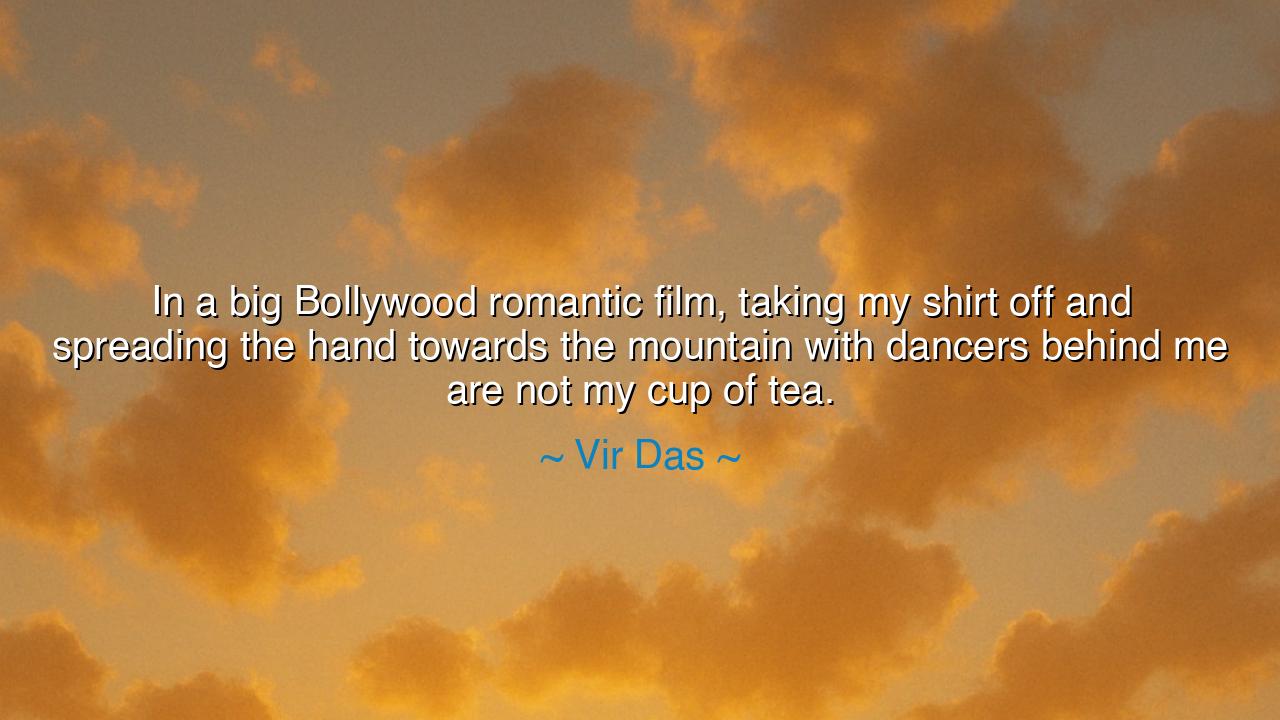
In a big Bollywood romantic film, taking my shirt off and
In a big Bollywood romantic film, taking my shirt off and spreading the hand towards the mountain with dancers behind me are not my cup of tea.






The words of Vir Das—“In a big Bollywood romantic film, taking my shirt off and spreading the hand towards the mountain with dancers behind me are not my cup of tea”—speak not only of cinema but of the deeper struggle between authenticity and artifice. In them we hear the refusal of a man to bow to spectacle for spectacle’s sake. He sees the grandeur of the Bollywood romantic film, with its sweeping gestures, choreographed perfection, and shimmering illusions, yet he chooses not to define himself by these conventions. His words are not contempt but clarity: a declaration that true artistry must be anchored in truth, not merely in tradition or expectation.
The origin of such a sentiment lies in the timeless tension between form and substance. Since the days of ancient theater, performers have wrestled with the line between performance and pretense. In Greece, actors donned masks to amplify emotion, yet philosophers like Plato warned that excessive artifice could mislead the soul away from truth. So too in India, the great Natya Shastra prescribed the sacred art of drama, reminding us that performance was not only entertainment but a mirror of life and morality. Das’s rejection of shirtless gestures and mountain-top theatrics is, in essence, a modern echo of this old warning: that the trappings of spectacle should never overshadow the heart of the story.
Consider history’s lesson in the tale of Diogenes the Cynic, the philosopher who mocked society’s pretensions. When Alexander the Great, clothed in the magnificence of empire, came to meet him, Diogenes simply said, “Stand out of my sunlight.” In this encounter, one man represented spectacle, power, and grandeur; the other, authenticity and simplicity. And though Alexander commanded armies, it was Diogenes who revealed the deeper wisdom. Likewise, Das’s words remind us that to reject hollow grandeur is not weakness but strength—the strength to remain true to one’s calling.
Yet his rejection of cinematic spectacle does not deny the romantic. For romance itself is not found in choreographed dances or mountainside poses, but in sincerity of feeling. To love truly does not require costume or chorus; it requires honesty. In this way, Das distinguishes between the manufactured romance of film and the lived romance of life. The former dazzles but fades; the latter endures. His refusal to embrace spectacle is therefore a defense of the deeper, quieter truths of human connection.
The lesson here is profound: we must not confuse glamour with greatness, nor spectacle with meaning. The world will tempt us to play roles we do not believe in, to don masks that bring applause but not fulfillment. Yet the wise will discern what is “their cup of tea” and what is not. To reject falsehood is not to reject beauty; it is to clear the stage for a more authentic beauty to appear.
Practically, this means living with integrity in the face of expectation. Each of us has a “mountain pose” we are pressured to enact—a role society demands, a gesture that wins approval but costs authenticity. The call of wisdom is to know ourselves well enough to say no when such demands arise, and to pursue the work, the love, and the art that align with our truest selves.
Thus, Vir Das’s words, though framed in jest, carry the tone of ancient counsel. They remind us that the dance of life must not be performed for others’ applause alone. The greatest stories are not told in orchestrated gestures but in the quiet courage of living with truth.
So let this teaching endure: whether on stage, on screen, or in life, reject the hollow spectacle. Choose authenticity over artifice, sincerity over show, truth over applause. For in that choice lies not only freedom, but the possibility of creating something that lasts beyond the glitter of the moment—something that touches the heart, unadorned, yet eternal.






AAdministratorAdministrator
Welcome, honored guests. Please leave a comment, we will respond soon